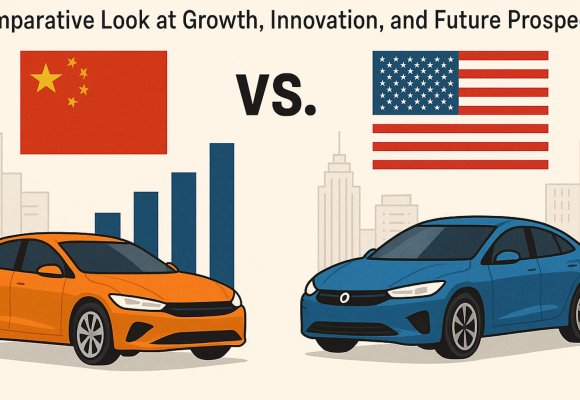|
LISTEN TO THIS THE AFRICANA VOICE ARTICLE NOW
Getting your Trinity Audio player ready...
|
The electric vehicle revolution is accelerating, with cutting-edge automakers competing to dominate the market through innovation, efficiency, and affordability. From Tesla’s industry-leading tech to BYD’s cost-disrupting models, these brands are redefining transportation. This ranking explores the top 10 EV manufacturers based on efficiency, popularity, ownership costs, and future potential—showcasing the pioneers driving us toward an electrified future.
1. Tesla (USA)
Tesla remains the undisputed leader in EVs, thanks to its relentless innovation in battery efficiency, autonomous driving, and charging infrastructure. With the Model Y as the world’s best-selling electric vehicle, Tesla continues to push boundaries with its 4680 battery cells and advancements in Full Self-Driving. Prospects include the Cybertruck’s mass rollout and Robotaxi ambitions, solidifying its dominance.
- Efficiency: Best range & energy optimization (e.g., 4.1 mi/kWh in Model 3 RWD)
- Average Cost to Own: 40,000–60,000 (after incentives)
- Most Popular Model: Tesla Model Y (world’s best-selling EV)
- Made in: USA
2. BYD (China)
BYD has surged past rivals by perfecting affordability without compromising quality. Its Blade Battery technology offers unmatched safety and cost efficiency, powering the Atto 3, a global best-seller. With plans to double production by 2025 and expand into Europe, BYD is poised to challenge Tesla’s throne.
- Efficiency: Blade Battery tech (low cost per kWh)
- Average Cost to Own: 25,000–40,000 (most affordable)
- Most Popular Model: BYD Atto 3 (a best-seller in Asia)
- Made in: China
3. NIO (China)
NIO blends luxury with groundbreaking battery-swapping stations, enabling 3-minute “refuels.” The ET5 sedan exemplifies its user-centric approach, while upcoming 150 kWh semi-solid-state batteries (2024) promise 600+ mile ranges. NIO’s expansion into Europe could make it a global premium contender.
- Efficiency: Battery-swapping saves time (3-min swaps)
- Average Cost to Own: 50,000–80,000
- Most Popular Model: NIO ET5 (Tesla Model 3 rival)
- Made in: China
4. Rivian (USA)
Rivian redefined electric adventure with the R1T, the first mass-market EV pickup. Its maximized off-road efficiency and Amazon-backed delivery vans showcase versatility. Future models like the R2 SUV (2026) aim for mainstream buyers, backed by Georgia’s $5B factory.
- Efficiency: Good for large EVs (2.1–2.5 mi/kWh)
- Average Cost to Own: 70,000 – 100,000+
- Most Popular Model: R1T (adventure truck)
- Made in: USA
5. Lucid Motors (USA)
Thanks to in-house motor and battery tech, Lucid’s Air Pure sedan boasts the longest EV range (516+ miles). With the Gravity SUV (2024) and a $50K model by 2025, Lucid targets Tesla’s luxury stronghold while pioneering 900V ultra-fast charging.
- Efficiency: Highest range (516+ miles in Air Dream Edition)
- Average Cost to Own: 80,000–250,000+
- Most Popular Model: Lucid Air Pure
- Made in: USA
6. BMW (Germany)
BMW’s i4 and i7 prove legacy automakers can compete, blending performance with luxury. Its Neue Klasse platform (2025) will introduce 30% more range and circular battery recycling. BMW’s hydrogen-compatible EVs hint at a diversified future.
- Efficiency: Solid but not class-leading (3.0–3.5 mi/kWh)
- Average Cost to Own: 55,000–90,000
- Most Popular Model: BMW i4
- Made in: Germany
7. Hyundai/Kia (South Korea)
Hyundai’s E-GMP platform powers the Ioniq 5, which features 800V charging (10–80% in 18 mins). The Ioniq 7 SUV (2024) and solid-state battery plans (2030) aim to dethrone Tesla in terms of affordability and tech.
- Efficiency: 800V charging (10–80% in 18 mins)
- Average Cost to Own: 35,000–55,000
- Most Popular Model: Hyundai Ioniq 5
- Made in: South Korea, USA, Europe
8. XPeng (China)
XPeng’s G6 SUV rivals Tesla with XNGP autonomous driving and 800V SiC fast charging. Its flying car prototype (2025) and robotaxi projects highlight ambitions beyond traditional EVs.
- Efficiency: Strong autonomous driving
- Average Cost to Own: 35,000–60,000
- Most Popular Model: XPeng G6
- Made in: China
9. Polestar (Sweden/China)
Polestar’s 2 and 3 models merge Volvo’s safety with Geely’s tech, offering sustainable materials and Android Automotive OS. The Polestar 4 (2024) and Precept concept focuses on AI-driven cabins.
- Efficiency: Good but not exceptional
- Average Cost to Own: 50,000–100,000
- Most Popular Model: Polestar 2
- Made in: China
10. Ford (USA)
Ford’s Mustang Mach-E and F-150 Lightning bring electric vehicles (EVs) to the masses, with Tesla Supercharger access boosting their appeal. The next-gen EV platform (2025) promises a 50% cost reduction, ensuring Ford stays relevant.
- Popularity: Mainstream EV adoption
- Efficiency: Average for class (2.5–3.0 mi/kWh)
- Average Cost to Own: 45,000–45,000–65,000
- Most Popular Model: Mustang Mach-E
- Made in: USA, Mexico
The EV revolution is just beginning. As adoption surges globally, expect new innovators from Europe, Asia, and even Africa to emerge, leveraging niches like battery recycling, charging infrastructure, or AI-driven mobility solutions. Nations without car manufacturing can lead in software, battery tech, or raw material refining, while India—already a tech powerhouse—could bridge affordability and scale in the next wave of EVs.








LEAVE A COMMENT
You must be logged in to post a comment.